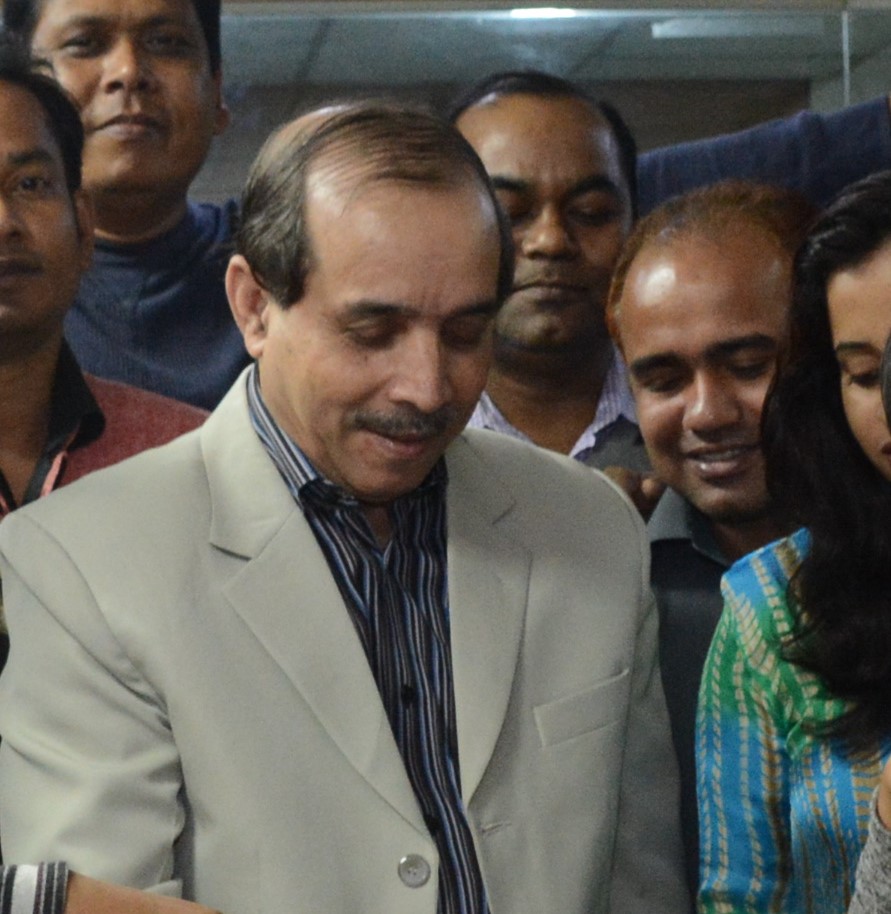
Mostafa Kamal Majumder
Environmentalist Sajid Kamal, son of eminent poet Begum Sufia Kamal, said about two decades ago – Bangladesh is a goldmine of solar energy. Before the present players started installing solar home systems in the country on a market-based approach Sajid Kamal had on his own distributed free of costs about half a dozen Solar Photovoltaic Systems in the first half of nineties of the last century.
His words looks proving true as the International Solar Alliance, launched in New Delhi on Sunday and heads of state or government who attended the ISA summit made very positive remarks about solar energy’s potentials. And French President Macron has committed another $700 million to the promotion of solar energy in emerging countries.The President of Bangladesh Abdul Hamid has taken part in the ground-breaking ISA summit in at India’s Rastrapati Bhaban and emphasized on unlocking the potentials of solar energy which holds nearly infinite promises for Bangladesh experiencing bright sunshine almost throughout the year.
The International Renewable Energy Agency, an affiliate of the UN System, on Sunday welcomed the establishment of the International Solar Alliance in line with the 2015 Paris Deal and issued a joint statement along with the newly launched body to collaborate with each other on advancing solar deployment and projects through helping countries develop policies and regulations around solar energy.
They said, ‘Driven by rapid advances in technology and economies of scale, the cost of electricity from solar photovoltaics decreased by almost 70 per cent between 2010 and 2016.
IRENA estimates that average cost of electricity from solar photovoltaics can decrease by further 60 per cent in the coming decade,’ the joint statement noted.
Bangladesh is the world leader in the installation of solar home systems. The solar energy sector promoted by state-owned agency, the Infrastructure Development Company Ltd (IDCOL) and introduced principally by actors like the Grameen Shakti for little over a decade since 2003, has now turned attractive to the private sector. And some projects for setting up solar mini power grids have already been planned for implementation in the country.
Up to May 2017, about 4.12 million SHSs have been installed under the program in the remote areas where electrification through gird expansion is challenging and costly. The programme has ensured the supply of solar electricity to 18 million people which make 12% of the country’s total population who previously used kerosene lamps for lighting purposes.
To remote households of about two crore people SHSs have brought a veritable revolution in the quality of life. Rapid expansion SHSs continues across Bangladesh with new private operators joining the arena. Learning of the advantage of solar power from the beneficiaries of SHSs, more people are getting attracted and buying those. The reasons are simple. SHSs involve one-time investment backed by micro-credit with little running or maintenance costs afterwards.
A distinctive advantage of solar energy was first felt in a cyclone shelter in Hatiya Island during the severe cyclone of 29 April 1991. Cyclone hit people who took refuge there could move about at night inside the structure despite the fury of the cyclone as they had light from a solar system when the rest of the coastal belt of Bangladesh remained plunged in darkness. The powerful sea storm had taken 140,000 lives, disrupted electric supplies from grids as electric poles were uprooted. Tidal waves, fallen trees and washed up debris had obstructed movement of people.
Even then 28 years ago some Western entrepreneurs, however, started investing in solar energy and a solar power station was launched commercially in California, the USA. In Bangladesh proponents of solar energy struggled all these years. Initially when the World Bank was subsidizing solar home systems the Customs authorities were taxing the import of solar photovoltaic panels which again were two times more costly in international markets. Gone are the anomalies and solar panels continue to be cheaper every year?
“The International Solar Alliance has a well-articulated goal to facilitate the mobilization of USD 1 trillion of capital to rapidly accelerate the adoption of solar energy all over the world,” said Upendra Tripathy, Interim Director-General of the International Solar Alliance.
“IRENA estimates that solar must account for at least 35 per cent of global power capacity by 2050 to meet the objectives the Paris Agreement on climate,” its Director General Adnan Z. Amin said in the joint statement with ISA.
Energy experts say, Bangladesh can heavily build on its experience in SHSs to setup and profitably run solar mini-grids and overcome dependence on dirty fossil-fuel- based energy against which the world is becoming increasingly more vocal. Harnessing of solar energy is more relevant not only because solar systems have become remarkably cheaper but also as international pressure against fossil fuels is becoming more intense.
The 23th conference of parties (climate change conference) in Bonn in November last year marked the emergence of a new alliance to quickly phase out coal spearheaded by UK and Canada enlisting the support of 17 other nations. It was a clear signal of a renewed fight against the dirty fuels of conventional energy.
The European Union remained loud and clear about its resolve to uphold the Paris Deal and promote the use of cleaner fuels. Estonia told the meet on behalf of the EU that the group would not walk away from its commitments.
Mexico, New Zealand, Denmark and Angola have expressed their oneness with UK and Canada, and have made new pledged to quickly phase out coal. The alliance against coal has set a target to have 50 members. There is no country which can morally speak against the members of the alliance as air pollution caused by coal, it is believed, causing about a million of deaths worldwide every year.
The climate change conference reached an understanding that the nations would make stocktaking of their contributions in reducing fossil fuel-based carbon dioxide emissions as per their Paris Deal Commitments. Energy planners in Bangladesh may take serious note of these developments plus opportunities brought forward by the International Solar Alliance to rely more on renewable energy, especially solar energy in which Bangladesh is rich with infinite potentials, and get rid of imported dirty energy. They should give serious thought over discontinuing the policy of power generation with imported dirty fuels which would be resisted not only in the international market but also by local consumers as well as buyers of Bangladeshi products abroad.
(The writer is the Editor, GreenWatch Dhaka and Consultant Editor of The Asian Age. This article was first published in the Daily Asian Age, Dhaka.)




